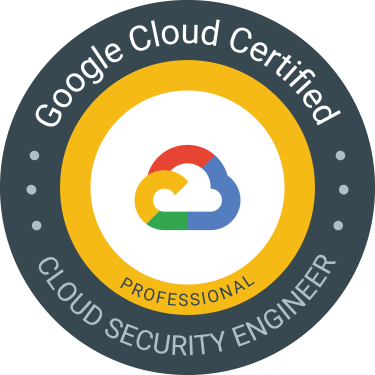Google - PCSE Certification Exam Details, Questions and Answers
Certification Provider
GoogleExam
PCSE: Professional Cloud Security EngineerNumber of questions (in our database)
95Updated on
25 January 2024
Topics
Google's Professional Cloud Security Engineer Certification Exam
About the Certification Exam
The Professional Cloud Security Engineer Certification exam is a prestigious certification provided by Google Cloud. This certification proves your skills and knowledge on the comprehensive suite of Google Cloud security tools and features. It is an industry-recognized certification that adds a great value to your professional career, helping you stand out among your peers.
Importance of the Certification Exam
This certification is important as it validates that the credential holder has the necessary skills to design, develop, and manage a secure infrastructure leveraging Google Cloud security technologies. This includes setting up a cloud solution environment, planning and configuring a cloud solution, deploying and implementing a cloud solution, and ensuring successful operation of a cloud solution.
Technical Details of the Certification Exam
The Professional Cloud Security Engineer exam is an online exam that must be taken in a proctored environment. The exam consists of multiple choice questions, and candidates are given two hours to complete it. The exam is available in English and Japanese.
Measured Skills
The following skills are measured in the Professional Cloud Security Engineer Certification exam:
- Configuring access within a cloud solution environment
- Configuring network security
- Ensuring data protection
- Managing operations within a cloud solution environment
- Ensuring compliance
Preparation Advice
To prepare for the Professional Cloud Security Engineer Certification exam, you should have a thorough understanding of Google Cloud security technologies and their applications. It is recommended to have hands-on experience with Google Cloud Platform through practice and work. There are several resources available for exam preparation, including Google's own training courses and study guides.
Exam Topics
-
Google Cloud Operations Security (10% - 20%)
- Logging and monitoring
- Cloud Audit Logs and Stackdriver Logging
- Cloud Monitoring and Stackdriver Monitoring
- Security Health Analytics and Security Command Center
- Incident management and forensics
- Compliance and security assessments
-
Google Cloud Security Management (10% - 20%)
- Security policies and standards
- Security organization and roles
- Security training and awareness
- Security incident response planning
- Business continuity and disaster recovery
- Third-party security assessments
-
Google Cloud Data Security (15% - 25%)
- Data encryption at rest and in transit
- Key Management Service (KMS)
- Cloud Data Loss Prevention (DLP)
- Data Discovery and Data Catalog
- Data access controls and data residency
- Data anonymization and de-identification
-
Google Cloud Networking Security (20% - 30%)
- Virtual Private Cloud (VPC) and subnets
- Firewall rules and security groups
- Cloud Load Balancing and Cloud CDN
- Cloud DNS and Cloud NAT
- Identity-Aware Proxy (IAP) and SSL policies
- Private Google Access and VPC Service Controls
-
Google Cloud Identity and Access Management (IAM) (20% - 30%)
- IAM roles and permissions
- Resource hierarchy and organization policies
- Service accounts and service account keys
- Identity providers and SAML
- Cloud Identity-Aware Proxy (IAP)
- Privileged access management
-
Google Cloud Security Concepts (15% - 25%)
- Google Cloud security principles
- Shared responsibility model
- Security design principles
- Security controls and services
- Data classification and protection
- Security incident response process